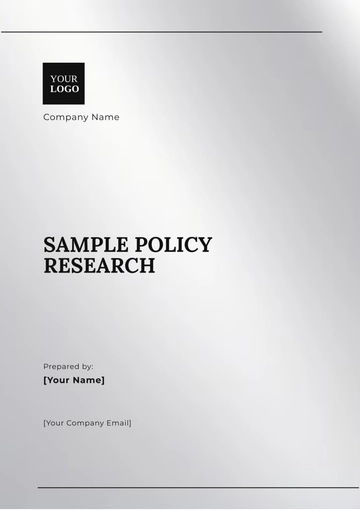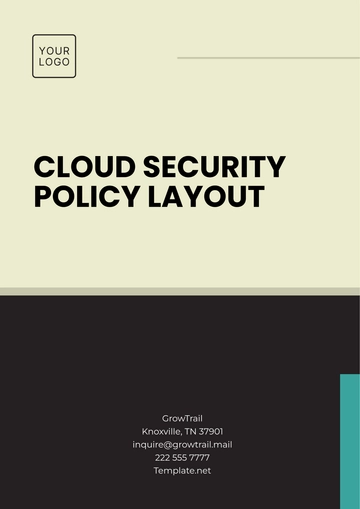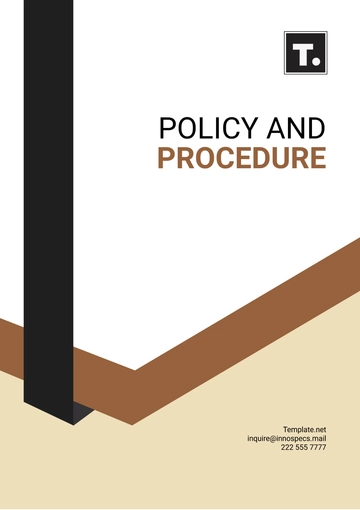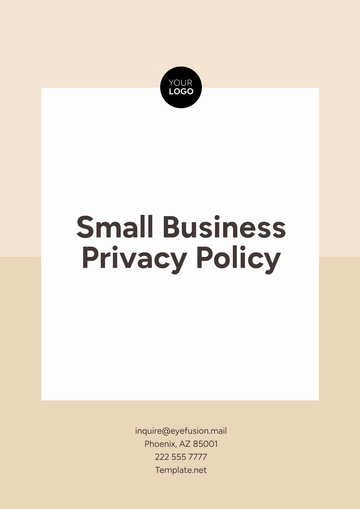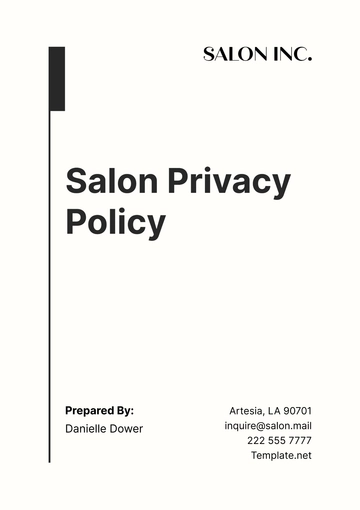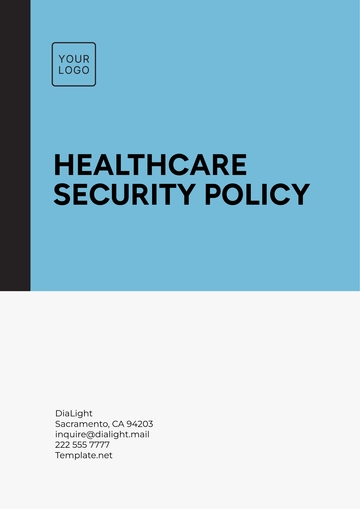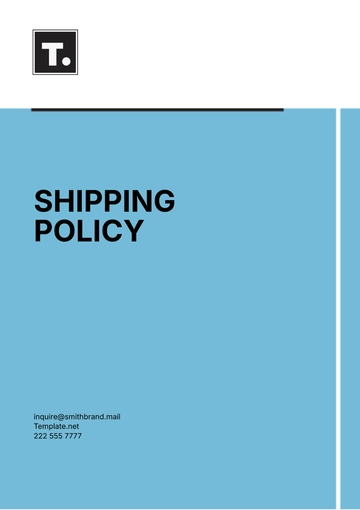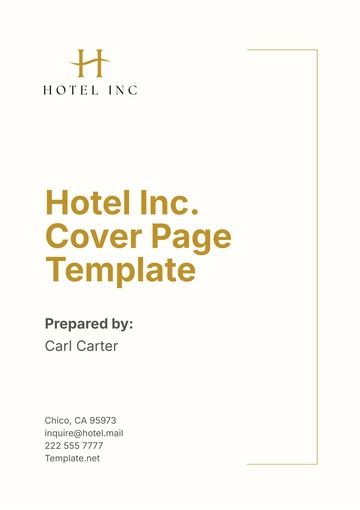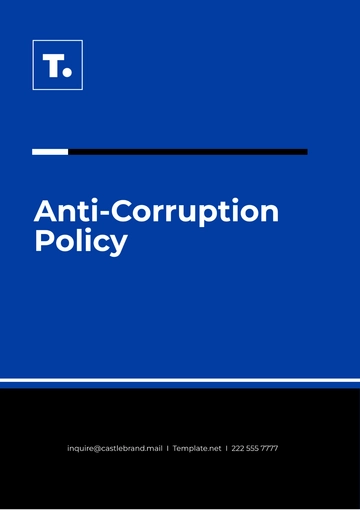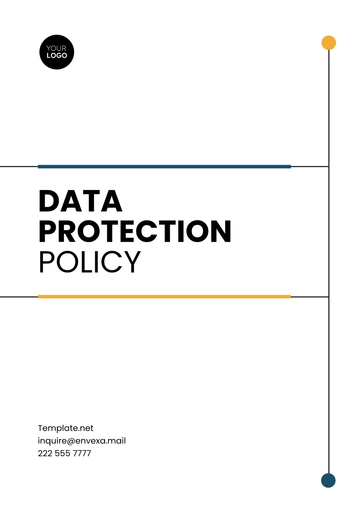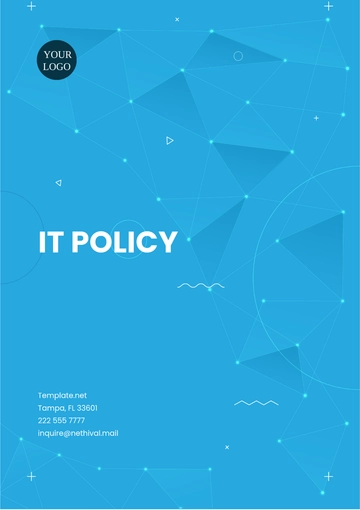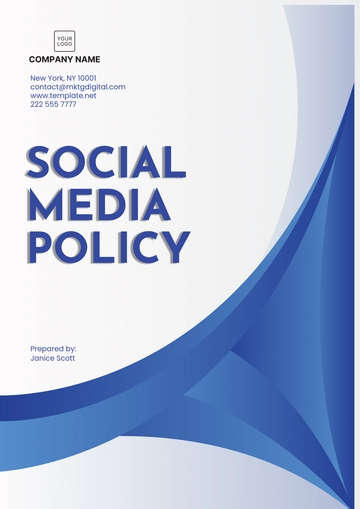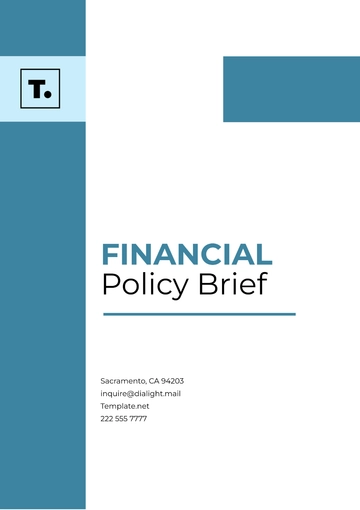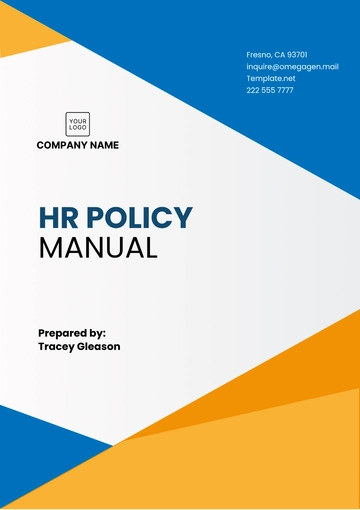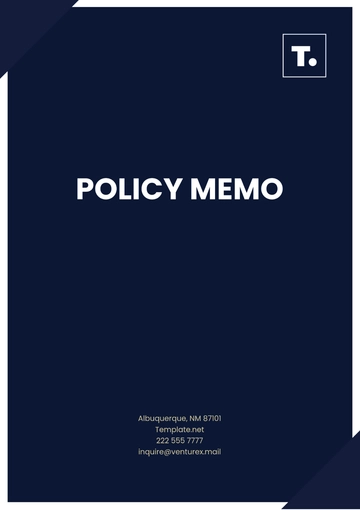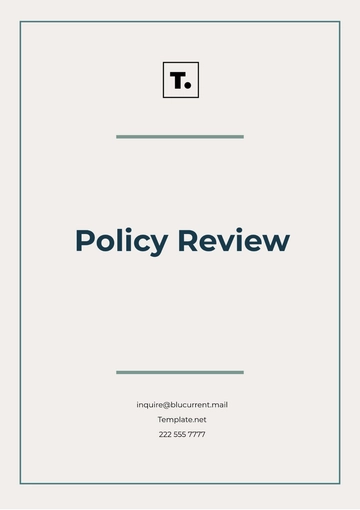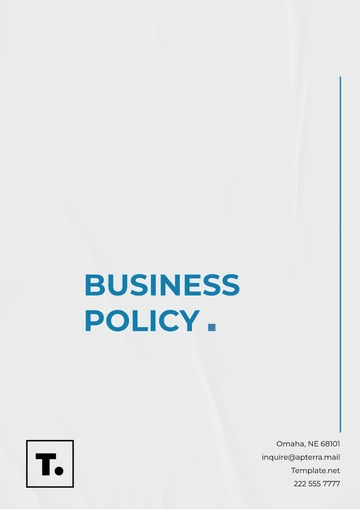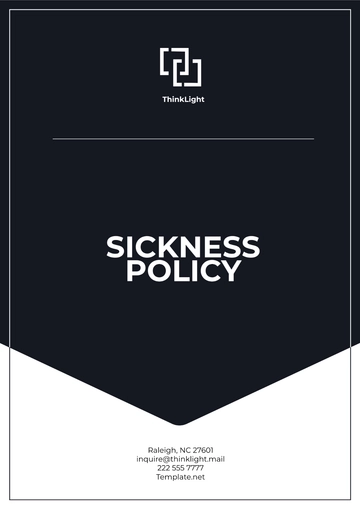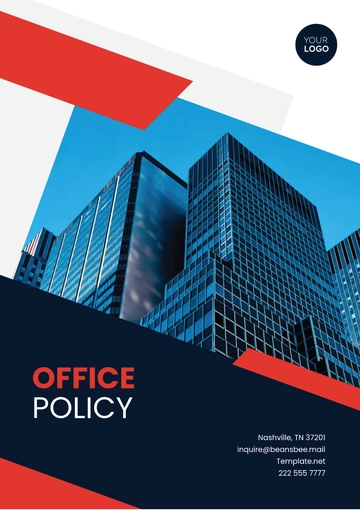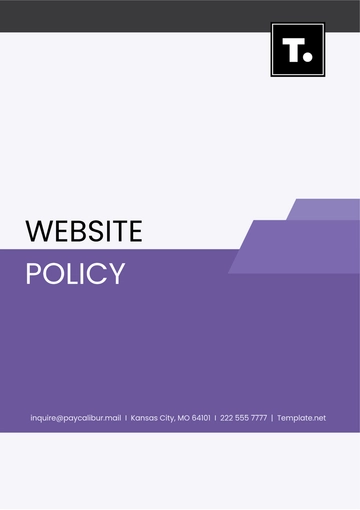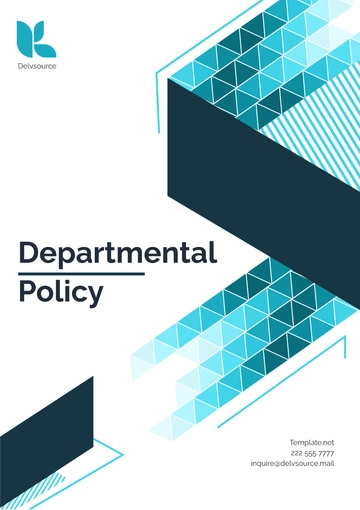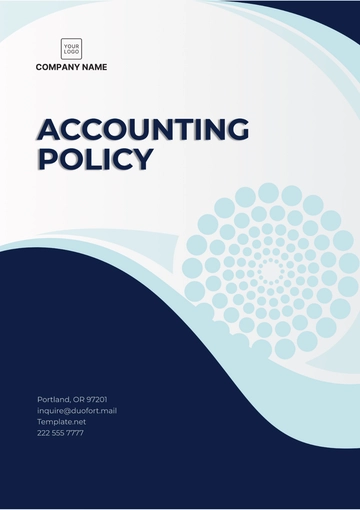Free Hotel Financial Policy
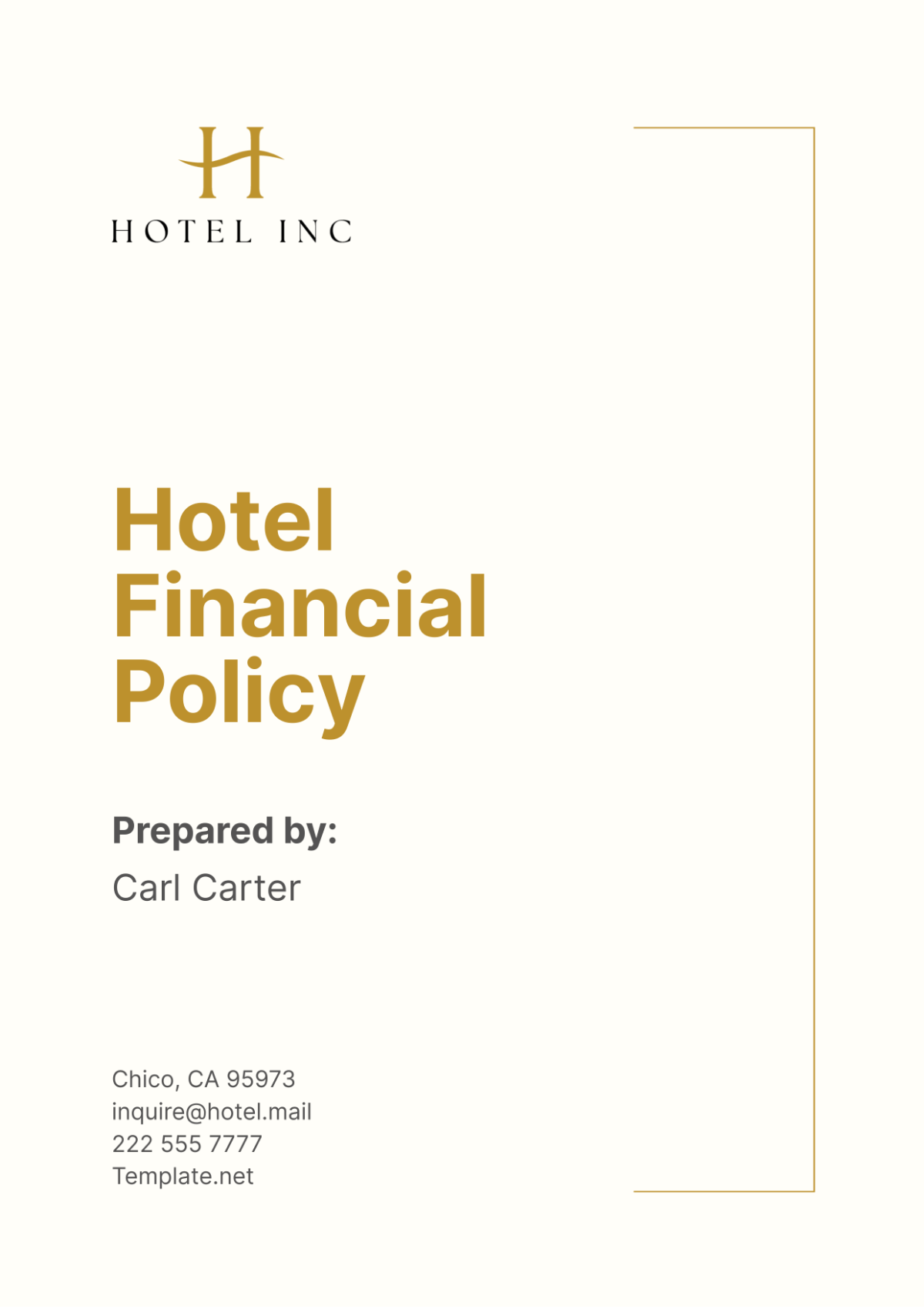
1. Introduction
This Hotel Financial Policy outlines the financial management framework for [Your Company Name]. It is designed to ensure sound financial practices, accountability, and sustainability in our operations. By adhering to these policies, we aim to maintain financial stability, achieve our strategic goals, and provide transparency to our stakeholders.
2. Objectives
The objectives of this Hotel Financial Policy are designed to establish a robust framework for financial management that aligns with our strategic goals. By setting clear financial objectives, we aim to ensure effective budgeting, forecasting, and financial planning. These objectives will guide our revenue management, cost control, and financial reporting practices, providing a foundation for sustainable growth and profitability.
The primary objectives of this financial policy are:
To establish a robust financial management framework that supports the hotel's strategic objectives.
To ensure effective budgeting, forecasting, and financial planning.
To implement rigorous revenue management and cost control measures.
To maintain accurate financial reporting and compliance with regulatory standards.
To safeguard the hotel’s financial assets through effective risk management and internal controls.
3. Financial Management Structure
Our financial management structure outlines the governance framework and defines the roles and responsibilities of key personnel involved in financial decision-making. This structure ensures that all financial activities are conducted transparently and align with the hotel’s strategic goals. Clear delineation of roles fosters accountability and effective management of financial resources.
Financial Governance
Financial governance is critical to ensuring that all financial activities align with the hotel’s strategic goals. The governance framework includes oversight by the Board of Directors, the Finance Committee, and executive management.
Roles and Responsibilities:
Board of Directors: Provides strategic direction and oversight of financial policies and practices.
Finance Committee: Reviews financial reports, budgets, and forecasts; recommends financial strategies to the Board.
Chief Financial Officer (CFO): Oversees all financial operations, including budgeting, financial reporting, and compliance.
Finance Manager: Manages daily financial activities, prepares financial reports, and ensures adherence to financial policies.
Department Heads: Responsible for managing departmental budgets and expenses in accordance with the financial policy.
4. Budgeting and Forecasting
Budgeting and forecasting are critical components of our financial planning process. This chapter details the procedures for preparing, reviewing, and approving the annual budget, as well as the ongoing forecasting activities. Effective budgeting and forecasting allow us to allocate resources efficiently, anticipate financial needs, and adjust our strategies based on current performance and market conditions.
Annual Budget Preparation
The annual budget preparation process involves input from all departments to ensure comprehensive financial planning.
Timeline: Budget preparation begins in September for the following fiscal year.
Process: Each department submits a budget proposal, which includes projected revenues, expenses, and capital expenditures.
Review: The Finance Manager consolidates departmental budgets and presents them to the Finance Committee for review.
Budget Approval Process
Initial Review: The Finance Committee reviews the consolidated budget and provides feedback.
Revision: Departments make necessary revisions based on feedback.
Final Approval: The revised budget is submitted to the Board of Directors for final approval by December 31st.
Forecasting
Forecasting is conducted quarterly to update financial projections based on current performance and market conditions.
Revenue Forecasting: Analyzes current booking trends, market conditions, and historical data.
Expense Forecasting: Reviews current spending patterns and adjusts projections accordingly.
5. Revenue Management
Revenue management is essential for optimizing our financial performance. This chapter focuses on the strategies and processes for managing and maximizing revenue streams. By employing dynamic pricing, tracking revenue accurately, and leveraging advanced revenue management tools, we aim to enhance our revenue generation and improve overall financial health.
Revenue Streams
The hotel's primary revenue streams include:
Room Revenue
Food and Beverage Revenue
Event and Conference Revenue
Spa and Wellness Revenue
Other Ancillary Services
Pricing Strategies
To maximize revenue, we employ dynamic pricing strategies that adjust room rates based on demand, seasonality, and competitor pricing.
Revenue Management Software: Utilized to analyze market trends and optimize pricing.
Promotions and Discounts: Strategically offered during low-demand periods to boost occupancy.
Revenue Tracking and Reporting
Revenue is tracked daily, and comprehensive reports are generated monthly.
Daily Revenue Reports: Provide real-time insights into revenue performance.
Monthly Revenue Reports: Summarize overall performance and identify trends.
6. Expense Management
Expense management is crucial for maintaining profitability and operational efficiency. This chapter outlines the categories of expenses, cost control measures, and the procedures for expense reporting and approval. By implementing stringent expense management practices, we ensure that our financial resources are used effectively and that unnecessary costs are minimized.
Expense Categories
Expenses are categorized to facilitate detailed tracking and management.
Operational Expenses: Includes salaries, utilities, maintenance, and supplies.
Capital Expenditures: Costs related to the acquisition and improvement of long-term assets.
Marketing Expenses: Costs associated with promotional activities and advertising.
Administrative Expenses: Includes legal fees, office supplies, and other administrative costs.
Cost Control Measures
Cost control is essential to maintain profitability. Measures include:
Regular Audits: Conducted quarterly to review and verify expenses.
Vendor Negotiations: Regularly negotiating with vendors to secure favorable terms.
Energy Efficiency Programs: Implementing initiatives to reduce utility costs.
Expense Reporting and Approval
All expenses must be reported and approved according to established procedures.
Expense Reports: Submitted monthly by department heads.
Approval Process: Expenses are reviewed and approved by the Finance Manager and CFO.
7. Financial Reporting
Accurate and timely financial reporting is vital for decision-making and accountability. This chapter details the types of financial statements we prepare, the reporting schedule, and our compliance with regulatory standards. Regular financial reporting provides insights into our financial performance and helps in making informed strategic decisions.
Financial Statements
Accurate and timely financial reporting is critical for decision-making and accountability.
Income Statement: Prepared monthly to report revenue and expenses.
Balance Sheet: Prepared quarterly to provide a snapshot of assets, liabilities, and equity.
Cash Flow Statement: Prepared monthly to track cash inflows and outflows.
Reporting Schedule
Report | Frequency | Responsible Party |
|---|---|---|
Income Statement | Monthly | Finance Manager |
Balance Sheet | Quarterly | Finance Manager |
Cash Flow Statement | Monthly | Finance Manager |
Budget vs. Actual | Quarterly | CFO |
Forecast Updates | Quarterly | Finance Manager |
Compliance and Audit
External Audits: Conducted annually by an independent audit firm.
Internal Audits: Conducted semi-annually to ensure compliance with financial policies and procedures.
8. Cash Management
Effective cash management ensures that the hotel has sufficient liquidity to meet its obligations and invest in growth opportunities. This chapter covers the policies and procedures for managing cash flow, bank reconciliation, and investment strategies. Proper cash management is essential for maintaining financial stability and supporting the hotel’s operational needs.
Cash Flow Management
Effective cash flow management ensures that the hotel has sufficient liquidity to meet its obligations.
Cash Flow Forecasting: Regularly updated to project future cash needs.
Working Capital Management: Ensures that current assets are managed efficiently to meet short-term liabilities.
Bank Reconciliation
Bank reconciliations are performed monthly to ensure the accuracy of cash records.
Process: Reconcile bank statements with internal cash records to identify discrepancies.
Responsibility: Conducted by the Finance Manager and reviewed by the CFO.
Investment Policies
Surplus funds are invested according to conservative investment policies to ensure capital preservation and liquidity.
Investment Vehicles: Include government bonds, high-grade corporate bonds, and money market instruments.
Risk Management: Investments are selected to minimize risk and ensure liquidity.
9. Risk Management
Risk management is a critical aspect of our financial policy, aimed at identifying, assessing, and mitigating financial risks. This chapter outlines our risk assessment processes, insurance policies, and contingency planning measures. By proactively managing risks, we protect our financial assets and ensure the hotel’s long-term sustainability.
Risk Assessment
Regular risk assessments are conducted to identify and mitigate financial risks.
Risk Identification: Identifies potential financial risks, including market risks, credit risks, and operational risks.
Risk Evaluation: Assesses the likelihood and impact of identified risks.
Insurance Policies
Comprehensive insurance coverage is maintained to protect the hotel's assets and operations.
Property Insurance: Covers damage to hotel property.
Liability Insurance: Covers legal liabilities arising from guest injuries or other incidents.
Business Interruption Insurance: Covers lost income due to unforeseen disruptions.
Contingency Planning
Contingency plans are developed to ensure business continuity in the event of a financial crisis.
Emergency Fund: Maintained to cover unexpected expenses.
Crisis Management Team: Established to coordinate responses to financial emergencies.
10. Internal Controls
Internal controls are essential for safeguarding the hotel’s financial assets and ensuring the integrity of our financial records. This chapter describes the control procedures, fraud prevention measures, and internal audit processes in place. Strong internal controls help prevent errors, detect fraud, and ensure compliance with financial policies.
Control Procedures
Internal control procedures are established to safeguard assets and ensure the integrity of financial records.
Segregation of Duties: Ensures that no single individual has control over all aspects of a financial transaction.
Authorization Controls: Requires appropriate authorization for financial transactions.
Reconciliation Procedures: Regular reconciliations of financial records to detect and correct errors.
Fraud Prevention
Measures are implemented to prevent and detect fraud.
Whistleblower Policy: Encourages employees to report suspected fraud.
Fraud Risk Assessments: Conducted regularly to identify and mitigate fraud risks.
Internal Audit
Internal audits are conducted to review financial operations and ensure compliance with policies.
Audit Schedule: Internal audits are conducted semi-annually.
Audit Reports: Findings and recommendations are reported to the Finance Committee and Board of Directors.
11. Compliance
Compliance with financial regulations and ethical standards is fundamental to our operations. This chapter outlines our commitment to regulatory compliance and the ethical standards we uphold in all financial dealings. Adhering to these standards ensures that our financial practices are transparent, responsible, and in line with legal requirements.
Regulatory Compliance
The hotel complies with all relevant financial regulations and standards.
Regulatory Monitoring: Regularly monitors changes in financial regulations.
Compliance Training: Provides training to employees on regulatory requirements.
Ethical Standards
High ethical standards are maintained in all financial dealings.
Code of Conduct: Establishes guidelines for ethical behavior.
Conflict of Interest Policy: Requires disclosure and management of potential conflicts of interest.
12. Conclusion
This Hotel Financial Policy provides a comprehensive framework for financial management at [Your Company Name]. By adhering to these policies, we aim to ensure financial stability, accountability, and transparency. Our commitment to sound financial practices will support the hotel's strategic goals and contribute to its long-term success.
Contact Information:
[Your Name]
[Your Company Name]
[Your Company Address]
[City, State, ZIP Code]
[Your Company Number]
[Your Company Email]
This financial policy document is intended to guide all financial activities within [Your Company Name]. Any questions or clarifications should be directed to the Finance Manager or the CFO.
- 100% Customizable, free editor
- Access 1 Million+ Templates, photo’s & graphics
- Download or share as a template
- Click and replace photos, graphics, text, backgrounds
- Resize, crop, AI write & more
- Access advanced editor
Ensure financial stability and transparency in your hotel operations with the Hotel Financial Policy Template from Template.net. This essential document outlines guidelines for budgeting, expense management, and financial reporting, ensuring compliance and accountability across your organization. Editable and customizable with our AI editor tool, it allows you to tailor policies to meet your hotel's specific needs and regulatory requirements. Streamline your financial practices and safeguard your hotel's success with this comprehensive template.
You may also like
- HR Policy
- Restaurant Policy
- Company Policy
- Accounting Policies and Procedures
- Website Policy
- Privacy Policy
- Safety Policy
- School Policy
- IT and Software Policy
- Law Firm Policy
- Construction Policy
- Interior Design Policy
- Travel Agency Policy
- Education Academic Policy
- Security Policy
- Real Estate Policy
- Expense Policy
- Software Policy
